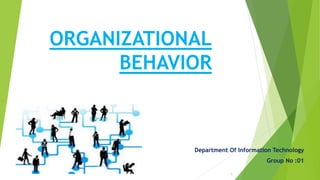
Organizational behavior
- 1. ORGANIZATIONAL BEHAVIOR Department Of Information Technology Group No :01 1
- 2. CONTENT Definition Of Organization Behavior. Origin. Key Theoretical Framework. Importance of Organizational behavior. Conclusion. 2
- 3. What is Organizational Behavior ? Organization: It is a group of people who are collected to work for a common goal with collective efforts. Behavior: It is a verbal or physical response shown by a person as a consequence of the impact of his/her surroundings. “Organizational Behavior as a systematic study of the actions and attitudes that people exhibit within the organization .” (Stephen P Robins) 3
- 4. ORIGIN 1. Classical Approach Scientific Management. (F.W.Taylor) Administrative Management. (Henry Fayol) Bureaucratic Management. (Max Weber) 4
- 5. 2. Human Relation Approach Hawthorne Studies –( Elton Mayo) . Findings Group can used by management to benefit the organization . Social aspects of work were paramount important to individuals. Changes in working conditions were followed by increased productivity. The effects of financial incentives on individual productivity were very poor. 5
- 6. Key Theoretical Framework 1.Behavioristic Framework 2.Cognitive Framework 3.Social Learning Framework 6
- 7. 1. Behavioristic Framework Study learning by focusing on observable events, both environmental and behavioral. This framework developed by Ivan Pavlov and J.B.Wotson. Organizational Behavior can be explained with help of Stimulus and Responses. Behavioristic framework : # Classical conditioning theory. # Operant condition theory. S R R S 7
- 8. 2.Cognitive Framework Cognition means the mental action or process of acquiring knowledge and understanding thought, experience and the senses. This framework was introduced by the “Edward Tolman”. Learning consists of the expectancy that particular event will leads to particular consequence. 8
- 9. 3.Social Learning Framework Explains human behavior in terms of continuous reciprocal interaction among Cognitive Behavioral Environmental Influences 9 Environmental Cognitive Behavioral
- 10. Importance of Organizational Behavior It builds better relationship by achieving people’s, organizational, and social objectives. Helps managers in understanding basis of motivation. Improves goodwill of the organization. It is multidisciplinary, in the sense that applies different techniques, methods, and theories to evaluate the performances. Helps to predict behavior of others. To enhance the productivity, efficiency and effectiveness. It covers a wide array of human resource like behavior, training and development, change management, leadership. 10
- 11. Conclusion Organizational behavior is the study of both group and individual performance and activity within an organization. When we consider about origin of OB , Classical and Human Relation Approaches can be identified. Behavioristic Framework can be divided as Classical Conditioning and Operant Conditioning . Cognitive approach emphasizes the positive and free wheel aspect of human behavior. Such as Expectancy, Demand and Intention . social learning framework explained in terms of a continuous reciprocal interaction among, Cognitive ,Behavioral ,Environmental Influences. Thus,Organizational Behavior plays an important role in the management of business. It is that field of study which finds out the impact that individuals, groups and structure have on behavior within an organization and it applies that knowledge to make organizations work more effectively. 11
- 12. References Luthans, F. (2011), Organizational Behavior, 12th edition, New York: McGraw-Hill Companies Inc. http://www.investopedia.com/terms/o/organizational-behavior.asp#ixzz4Wka18MNw 12
- 13. THANK YOU !